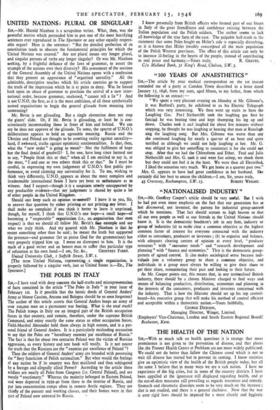UNITED NATIONS: PLURAL OR SINGULAR?
SIR,—Mr. Harold Nicolson is a scrupulous writer. What, then, was the powerful motive which persuaded him to pen one of the most horrifying sentences ever reproduced in The Spectator or any other equally respect- able organ? Here is the sentence: "But the detailed perfection of its constitution tends to obscure the fundamental principles for which the United Nations was created." Are not plural nouns any longer plural, and singular persons of verbs any longer singular? Or was Mr. Nicolson seeking, by a frightful defiance of the laws of grammar, to assert the triumph of the nations over their diversity? His assessment of the sessions of the General Assembly of the United Nations opens with a confession that they present an appearance of "organised unreality." All the admirable, descriptive touches which his article contains go to support the truth of the impression which he is at pains to deny. Was he forced back upon an abuse of grammar to proclaim the arrival of a new inter- national order, because grammar, unabused, "cannot tell a lie " ? And is not U.N.O. the first, as it is the most ambitious, of all these synthetically named organisations to begin the general glissade from meaning into unmeaning?
Mr. Bevin is not glissading. But a single abstention does not stop the giants' slide. Or, if Mr. Bevin is glissading, at least he is con- scientiously incommoding those in front of him and behind. We can say he does not approve of the glissade. To some, the spectre of U.N.O.'s deliberations appears to hold an agreeable meaning. Russia and the Ukraine and Poland are thought to be asserting reality against unreality— hard, if awkward, truths against optimistic sentimentalities. Is that, then, what the "new order" is going to mean? - Not the fulfilment of hope but the final denial of goodwill? • I, for one, have long since learned not to say, "People think this or that," when all I am entitled to say is, at the most, "I and one or two others think this or that." So I must be careful, in expressing my own judgement of U.N.O.'s first public per- formance, to avoid claiming any universality for it. To me, wishing to think very differently, U.N.0._appears as about the most complete -and irredeemable international fiasco I have yet been so unfortunate as to witness. And I suspect—though it is a suspicion utterly unsupported by any producible evidence—that my judgement is shared by quite a lot of other people in the United Kingdom.
Should one keep such an opinion to-oneself? I leave it to you, Sir, to answer that question by either printing or not printing my letter. I shall make no complaint if you think it better to leave it unprinted, though, for myself, I think that U.N.O.'s one hope—a small hope—of becoming a " respectable " organisation (i.e., an -organisation that- men respect) is that we should all follow Mr. Bevin's Slue example and say what we truly think. And my quarrel with Mr. Nicolson is that he meant something other than he said ; he meant the truth but supported the pretence—and grammar (let us praise God for the grammarians) has very properly tripped him up. I mean no disrespect to him. It is the mark of a good writer and an honest man to suffer that particular type of refutation at his own hand.—I am, Sir, &c., GEOFFREY FABER. United University Club, r Suffolk Street, S.W.'.
[The term United Nations, representing a single organisation, is properly followed by a singular verb, just as United States is.—En., The Spectator.]


























 Previous page
Previous page